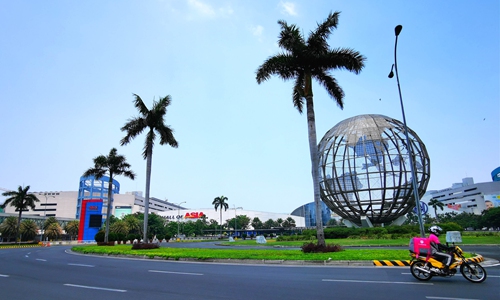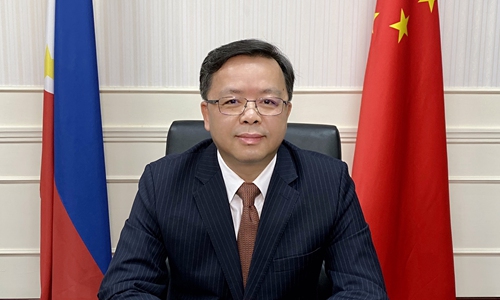China-Philippines ties see transformation and upgrading amid COVID-19
By Huang Xilian Source: Global Times Published: 2020/7/20 20:43:40

Few people were seen in front of the Mall of Asia in Manila, capital of the Philippines, on May 10 amid the COVID-19 pandemic. Photo: cnsphoto
The year 2020 marks the 45th anniversary of the establishment of diplomatic ties between China and the Philippines. The year has also witnessed the strengthening of the profound friendship between our two countries in our common battle against the COVID-19 pandemic that has swept the world.
In the fight against the pandemic, China and the Philippines have forged a closer partnership through anti-COVID-19 cooperation, setting a good example for international cooperation.
At present, both countries are making every effort to accelerate work resumption and help the general public resume their lives.
At the same time, we are continuing to synergize the Belt and Road Initiative (BRI) with the Philippines' "Build, Build, Build" infrastructure program, and are steadily carrying out major cooperation projects in infrastructure construction to further consolidate and upgrade China-Philippines relations.
Ensuring essential flows
As the most serious global crisis since World War II, the pandemic has had a far-reaching impact on the economic development of countries including China and the Philippines in both demand and supply, with travel restricted, and global production and supply chains disrupted.
Faced with the severe challenges brought about by the pandemic, China rapidly curbed the spread of virus and took the lead in driving the resumption of business and production. China sees the BRI as the most important platform to strengthen dialogue and cooperation with the Philippines and other countries along the route. China and the Philippines have been negotiating the establishment of a "fast track" for two-way essential travel, and a "green channel" for smooth flows of goods to ensure the stability of industrial and supply chains.
Thanks to the joint efforts of China and the Philippines, the BRI has created opportunities for and injected vitality into bilateral economic and trade exchanges.
According to Chinese statistics, bilateral trade reached $19.37 billion in the first five months of this year, and China remains the largest trading partner of the Philippines. China's direct investment in the Philippines reached $18.25 million, up 82.5 percent year-on-year.
Public health cooperation
Against the backdrop of the COVID-19 pandemic, China, the Philippines and other BRI partners have accelerated their cooperation in the field of public health, and are committed to building a "Health Silk Road" and a community of common health for mankind.
Since the outbreak, the Philippines has provided valuable support to China, and China is also working through various channels to fully support the Philippines' fight against the virus, including the timely dispatch of experienced medical experts and the supply of medical materials to the Philippines.
Up until now, the Chinese government has provided the Philippines with a total of 252,000 testing kits, 130 ventilators, 1.87 million medical masks, as well as protective suits, goggles and other virus prevention materials.
A large number of local Chinese governments, enterprises and civil groups have donated tens of millions of sets of PPE and other medical supplies to local governments and hospitals in the Philippines.
When a Chinese COVID-19 vaccine is developed and put into use, China will make it a global public good and give supply priority to the Philippines.

Huang Xilian, Chinese Ambassador to the Philippines Photo: Courtesy of the Chinese Embassy in the Philippines
Promoting connectivityUnder the guidance of a memorandum of understanding on jointly promoting the BRI, China has strengthened the coordination of the BRI and the Philippines' "Build, Build, Build" infrastructure program. We have coordinated virus prevention and control efforts, resumed work and production, and promoted the construction of key cooperation projects in the Philippines in an orderly manner, helping to stabilize the local economy, ensure employment and improve people's livelihoods in the country.
Steady progress has been made in key projects involving Chinese assistance, such as the two bridges over Pasig River in Manila and the Philippine National Railways South Long-Haul Project.
In the first five months of this year, newly signed contracts for Chinese projects in the Philippines amounted to $3.11 billion, up 29.5 percent year-on-year, witnessing turnovers of $970 million, up 13.2 percent year-on-year.
As the resumption of work and production proceeds in an orderly manner, there will be more Chinese-financed projects in the Philippines, which will inject strong impetus into local economic recovery and the improvement of people's livelihoods.
Sustainable growth
During the pandemic, new industries and business models have emerged, creating new lifestyles such as working from home, telecommuting and e-commerce.
Companies from China and the Philippines have made active use of the "Silk Road e-commerce" platform to give full play to the advantages of cross-border e-commerce and work hard to cope with the challenges to cross-border trade and investment brought about by the pandemic.
As regular virus prevention and control measures worldwide have become the new norm, China and the Philippines will actively explore ways to strengthen cooperation in e-commerce, 5G, big data, AI and cloud computing. By building a "Digital Silk Road" and a "Green Silk Road," we can not only promote economic recovery on the basis of transformation and upgrading, but also achieve high-quality sustainable development, benefiting our two peoples.
The author is Chinese Ambassador to the Philippines
Newspaper headline: Deepening joint BRI efforts
RELATED ARTICLES:
Posted in: ECONOMY